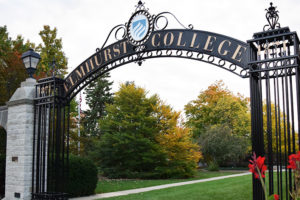
Julia Keller is a novelist, journalist, teacher and determined polymath.
As the cultural critic of the Chicago Tribune, she won the Pulitzer Prize and wrote essays and stories “about just about anything,” including literature, music, television, science and sports. She has taught at Princeton, Notre Dame, the University of Chicago and Ohio University. With the skills and perspective of a natural synthesizer, she uncovers the commonalities of science and art.
On April 23, speaking to a lively crowd at Elmhurst College, Keller lamented that schools and society push students too early onto humanities or science tracks. This early specialization has led to a lack of mutual comprehension and understanding and, ultimately, a lack of a common culture.
“We have lowered our expectations of today’s students,” she said. “We tell them to pick a major, get a degree, find a job, get a paycheck and call it a life.”
She encouraged teachers to move students beyond their areas of comfort, to push biology majors to read poetry and English majors to learn about the scientific research taking place on campus.
“Even in this age of necessary specialization, we still can have a common culture,” she said. “But that place has to be created, nurtured and fought for.”
Keller is the author of Bitter River (2013), the second novel in the critically acclaimed series set in her home state of West Virginia. In 2005, when she was cultural critic and a reporter for the Chicago Tribune, Keller won the Pulitzer Prize in feature writing for what the judges called a “gripping, meticulously constructed account” of the April 2004 tornado that killed eight people in Utica, Ill.
She was a Nieman Fellow at Harvard University and the McGraw Professor of Writing at Princeton University, and has served four times as a juror for the Pulitzer Prizes. Her reviews and commentary have aired on National Public Radio and The NewsHour on PBS.